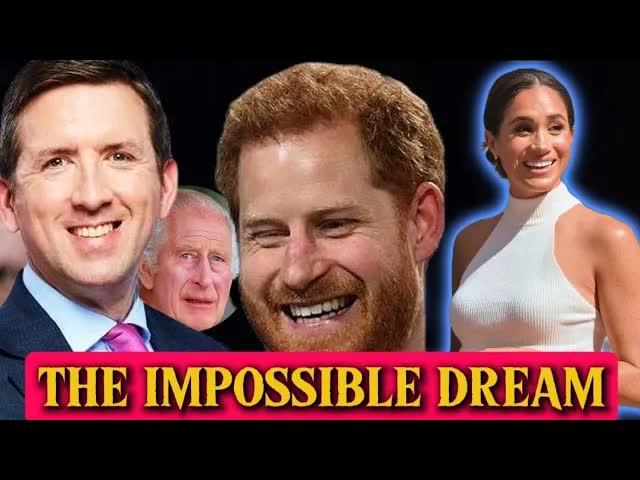In the world of royal gossip, few topics ignite as much fervor as the potential return of Prince Harry and Meghan Markle to the British royal family.
Yet, some commentators, like Richard Eden, seem to be clinging to a fantasy that the couple might one day step back into their former roles.
Eden’s recent remarks suggest that any hope of a homecoming is contingent upon a complete transformation of their current lifestyle, which seems downright unrealistic.
Eden’s conditions for reconciliation go beyond a mere apology or public acknowledgment.
He proposes that Harry and Meghan would need to abandon their successful ventures in the United States, shedding their newfound independence for a life steeped in royal duties and obligations.
This would represent a monumental shift for the couple, who have embraced a new way of living far removed from the constraints of royal protocol.
Despite the persistent calls for their return, the reality is that Harry and Meghan have established a life in America that allows them to escape the relentless scrutiny of the British press.
Their current situation offers them a level of freedom that is almost unheard of for royals, enabling them to pursue personal projects and raise their children without the constant watchful eye of the media.
Interestingly, the potential for a royal welcome back hinges on King Charles’ reign.
Palace insiders seem to be contemplating a model akin to that of Prince Edward and Sophie, who have successfully balanced their business interests with royal duties.
This dual approach may appear appealing to Harry and Meghan, yet the couple’s financial independence complicates this narrative.
The Sussexes have carved out a niche for themselves in the commercial realm, securing lucrative deals with major companies and launching their own media ventures.
This newfound financial autonomy allows them to cover their own expenses, including security costs, which stands in stark contrast to the media’s desire to see them return to royal dependency.
For years, the British media has been relentless in its criticism of Harry and Meghan’s decision to step back from royal responsibilities.
The couple’s independence has often been framed as a betrayal, with headlines fixated on their earnings and questioning the legitimacy of their charitable endeavors.
This negative portrayal serves to undermine their achievements and casts doubt on their motivations.
Moreover, the media’s obsession with their financial affairs creates an environment that makes returning to royal life even less attractive.
The constant scrutiny and skepticism about their intentions can feel suffocating, especially for a couple that has actively sought to protect their privacy and control their own narrative.
Ultimately, the decision to return to royal life will depend on whether Harry and Meghan are willing to relinquish the freedom they have fought so hard to attain.
They have built a new existence that prioritizes their family’s well-being, distancing themselves from the toxic elements of their past.
The prospect of re-entering a world that subjected them to intense scrutiny and mental health challenges is likely to weigh heavily on their minds.
The treatment of Harry and Meghan by the UK media has been nothing short of appalling.
From the outset of their relationship, they have faced a barrage of invasive coverage and negativity.
This hostility is particularly pronounced concerning their success and financial independence, which seems to incite a deep-seated resentment among certain media figures.
Instead of celebrating their achievements, the media often resorts to disparaging the couple, blurring the lines between news and sensationalism.
The vitriol directed at them is evident in the backlash against their ability to afford a lavish lifestyle in Montecito, California.
Their success appears to challenge the established order, prompting a furious response from the press.
The likes of Piers Morgan exemplify this media culture, unleashing venomous rhetoric that reflects a broader disdain for Harry and Meghan’s independence.
This pattern of behavior reveals a troubling tendency within the UK media to target and vilify those who dare to defy traditional power structures, often sacrificing truth and fairness in the process.
As Harry and Meghan continue to navigate their lives outside the royal family, security concerns remain a significant issue.
The couple has faced escalating threats since their relationship became public, necessitating robust protection measures.
The media’s relentless pursuit of their every move only exacerbates these security challenges, making it nearly impossible for them to live freely.
The public perception of charity work also highlights a glaring disparity.
While Sophie’s efforts are often praised, Meghan’s initiatives are frequently dismissed as mere profit-making ventures.
This discrepancy underscores the unrealistic expectations placed on the Sussexes, suggesting they should not earn a living outside royal patronage.
As the narrative continues to evolve, it seems increasingly unlikely that Harry and Meghan will return to the royal fold.
Their journey has been marked by resilience and a determination to forge their own path, free from the constraints of royal life.
The question remains: will they sacrifice their hard-won freedom for the sake of royal acceptance?
